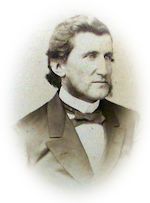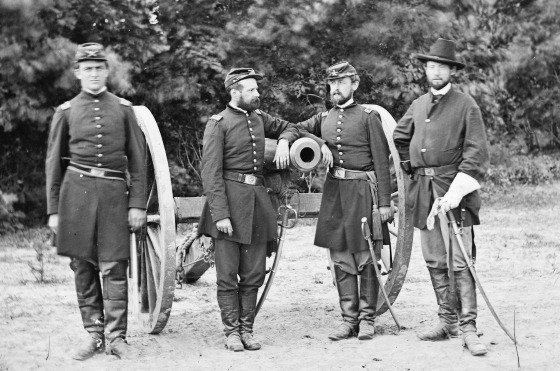June 15th. Weather hot and uncomfortable. Had a regimental inspection in the morning, found the men fully equipped. Company G joined us to-day from Dispatch Station, where it has been on duty since our arrival on the Pamunkey. At 6 P. M. General French sent for all the regimental commanders and told them there was a report that the rebels intended making an attack on the works to-night; they are to wear white bands in their hats, to distinguish them, and hope to capture the army of the Potomac asleep. The orders are to inspect the arms and load the pieces, issue extra ammunition, and remain all night on the color line, sleeping on our arms. I hope the report may prove true, and that they will come, but none of us believe it possible.
Friday, June 15, 2012

A report that the rebels intend making an attack on the works to-night.–Diary of Josiah Marshall Favill.
Dr. Hugh Lenox Hodge to Georgeanna Woosey.
Philadelphia, June, 1862.
Dear Georgy: Once more our paths have separated. . . . Upon my return with the wounded from the battle of Fair Oaks, I received appointment to a large hospital (1,500 beds), now building in West Philadelphia. I will live at home, but will be there a part of each day.
The Pennsylvania delegation to which, as you know, I was attached when at the White House and elsewhere, has been dissolved.
 Trinity-Sunday, June 15. [Okolona, Mississippi]—Mr. Clute preached an excellent sermon on the Trinity. I have seen a good deal of Mr. and Mrs. C, and am much pleased with both. I could not help being a little astonished at the poor-looking house they live in; and I am told that Mr. C. scarcely gets enough money to live on. Surely this rich place ought to be able to support their pastor better. I thought we were bad enough in the city in supporting the gospel, but the people in the country seem to be more remiss in that respect than we are. I am afraid I will have to believe, what I have often been told by people from the old country, that we have not enough of religion among us to support its teachers.
Trinity-Sunday, June 15. [Okolona, Mississippi]—Mr. Clute preached an excellent sermon on the Trinity. I have seen a good deal of Mr. and Mrs. C, and am much pleased with both. I could not help being a little astonished at the poor-looking house they live in; and I am told that Mr. C. scarcely gets enough money to live on. Surely this rich place ought to be able to support their pastor better. I thought we were bad enough in the city in supporting the gospel, but the people in the country seem to be more remiss in that respect than we are. I am afraid I will have to believe, what I have often been told by people from the old country, that we have not enough of religion among us to support its teachers.
This evening I visited a very nice family where there were two very pretty girls, both quite young. I was surprised when all took out bottles of snuff and commenced dipping. There were many lamentations at the high price of snuff. These ladies chewed this horrid stuff with as much zest as a man would his tobacco; indeed, I think I would much prefer the latter, though both are most disgusting. It is a common practice among the ladies in this state to “dip” snuff, and I am told it is the same in the other southern states.
Officers of Battery C, 3rd U.S. Artillery. L-R: Meinell, Gibson, Pendleton, and Fuller. (names from Wikipedia)
The Horse Artillery Brigade of the Army of the Potomac was a brigade of various batteries of horse artillery during the American Civil War.
From Library of Congress:
Title: Fair Oaks, Va., vicinity. Capt. Horatio G. Gibson (second from left) and officers of his battery
June 1862
Photographed by James F. Gibson
Photograph from the main eastern theater of war, the Peninsular Campaign
Civil War glass negative collection. Library of Congress Prints and Photographs Division Washington, D.C. 20540 USA
Record page for this image: http://www.loc.gov/pictures/item/cwp2003000081/PP/
June 15.—The rebel General J. E. B. Stuart, with a cavalry force, left the rebel lines near Richmond, Va., on the thirteenth, and rode through the lines of the right wing of the Union army in front of Richmond to Garlick’s Landing, Pamunkey River, where he burned two schooners. Thence to Tunstall’s station, where he fired into, but failed to capture, a railroad train; thence rode around the left wing of the Union army, and into Richmond again to-day. (Doc. 67.)
—Lieutenant Commanding Howell, in the Union gunboat Tahoma, accompanied by Lieut. Commanding English, in the Somerset, crossed the bar of Saint Mark’s River, Florida, and drove out a company of rebel artillery, with four or five field-pieces, from a fort near the lighthouse on that river, afterwards landing and burning the fort with the buildings used as barracks.—Official Report.




